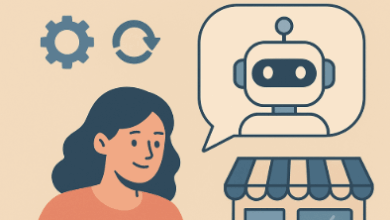AI and the Future of Work
The role of artificial intelligence (AI) in reshaping industries worldwide is no longer just a future projection; it’s happening right now. AI technologies are revolutionizing various sectors by automating tasks, enhancing decision-making, and improving efficiency. In the context of the workplace, AI is creating opportunities and challenges that will redefine the way we work.
AI-Powered Automation: Efficiency at Scale
One of the most significant impacts of AI in the workplace is automation. AI can handle repetitive tasks more accurately and faster than humans. This includes everything from data entry to customer service, using AI chatbots and virtual assistants. According to research, up to 47% of jobs in the U.S. could be automated by AI technologies by 2030.
Automation not only boosts productivity but also allows employees to focus on more creative and strategic work. However, this shift may require businesses and workers to adapt by developing new skills, particularly in tech-driven roles such as data science, machine learning, and AI management.
AI in Decision-Making: Smarter Business Strategies
AI is not limited to automating basic tasks; it’s also enhancing decision-making processes. Machine learning algorithms analyze large datasets to uncover patterns, predict future trends, and recommend actionable insights. For instance, AI can help businesses optimize supply chains, personalize marketing campaigns, and even predict customer behavior. This data-driven decision-making is key to staying competitive in today’s fast-paced economy.
Companies like Amazon, Netflix, and Tesla are already using AI to refine their strategies and improve user experiences. By leveraging AI insights, organizations can make informed decisions faster, leading to more effective operations.

AI and Job Creation: New Roles in Emerging Fields
While AI may lead to the automation of certain roles, it will also create new job opportunities. The rise of AI has spurred demand for specialists in fields like data analysis, AI ethics, and cybersecurity. These new roles require a blend of technical expertise and ethical consideration, ensuring that AI systems are safe, secure, and fair.
Moreover, as AI technologies become more integrated into everyday work, roles related to managing AI systems will emerge. Training and upskilling employees to adapt to these new roles will be crucial for businesses that want to stay competitive in an AI-driven world.
Challenges of AI: Ethics and Workforce Displacement
Despite its many advantages, AI also presents challenges, particularly in terms of ethics and workforce displacement. Automation could potentially lead to job loss in certain sectors, such as manufacturing and customer service. It’s important for companies and governments to address this issue by investing in retraining and education programs to help workers transition into new roles.
Additionally, AI raises ethical concerns about privacy, security, and bias. AI systems are only as good as the data they are trained on, meaning they can inadvertently perpetuate biases present in their datasets. Ensuring transparency and fairness in AI algorithms is essential to prevent discrimination and ensure trust in AI technologies.
The Future of Work: A Collaborative Approach
The future of work will likely be defined by a hybrid model where humans and AI collaborate. AI will take over mundane and data-driven tasks, while human workers will focus on creative, strategic, and empathetic roles. This symbiotic relationship will enhance productivity and innovation across industries.
To thrive in this AI-powered future, businesses must invest in technology and their workforce. Upskilling employees, fostering innovation, and implementing ethical AI practices will be key to building a sustainable and inclusive future of work.
Conclusion
AI is transforming the global workplace by automating tasks, enhancing decision-making, and creating new job opportunities. While there are challenges, such as workforce displacement and ethical concerns, the benefits of AI are undeniable. By embracing AI and preparing for the changes it brings, businesses and workers alike can thrive in the evolving landscape of work.




Bir Yorum